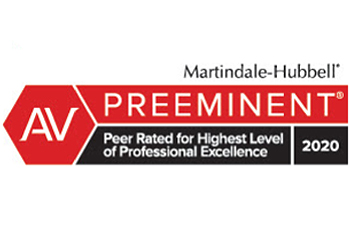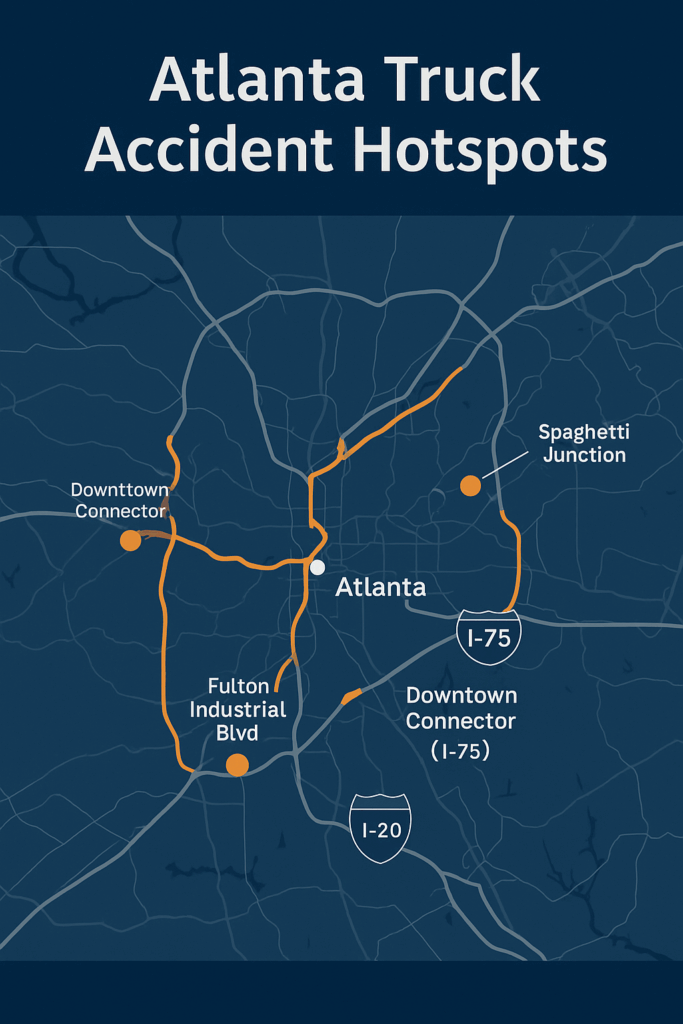Recognized by Super Lawyers®, National Trial Lawyers Top 100, and AV-Preeminent® Rated
Every year, thousands of crashes in Atlanta involve delivery trucks, buses, rideshare cars, and other commercial vehicles — from
tractor-trailers on I-285 and I-75 to MARTA buses and company vans on Peachtree Street.
These collisions often leave victims facing serious injuries, mounting medical bills, and insurance companies determined to limit payouts.
At Thompson Law, The Lion of Atlanta, we dedicate more than 95% of our practice to injury victims — preparing every case as if it will go to trial.
Our team knows the local roads, courts, and insurers, and we fight to secure the maximum recovery our clients deserve.
Atlanta Office:
1201 Peachtree St NE, Suite 2200, Atlanta, GA 30361
Call Now:
(678) 981-9022 |
FREE Consultation

Recognized by Super Lawyers®, National Trial Lawyers, and
AV-Preeminent peer ratings. Our national results are led by founding attorney
Ryan L. Thompson and brought to Georgia by our Atlanta trial team.
 |
 |
 |
 |
 |
 |
 |
 |
 |
 |
||
$1.9 Billion+ RecoveredWe’ve delivered record-setting results for Georgia injury victims — including catastrophic truck and bus accident cases — proving insurers we won’t settle for less. |
Atlanta Focus, Georgia CoverageWe know Atlanta’s crash corridors — I-285, I-75/85, Peachtree Industrial — and use that insight to anticipate defense strategies and jury expectations. |
Rapid Evidence PreservationWe immediately secure EDR “black box” data, maintenance logs, GPS, and driver qualification files — critical in commercial claims before they disappear. |
Full-Value Recovery StrategyMedical bills, future care, lost earning capacity, and non-economic harms like pain, suffering, and loss of life enjoyment — maximized and documented. |
Trial-Ready LawyersInsurers pay attention when they know we will take a case to court. We prepare from day one to position your claim for the strongest possible result. |
No Win, No FeeFree consultation. No upfront costs. We only get paid if we recover money for you. |
| Recognitions: | Super Lawyers® | AV-Preeminent | Million & Multi-Million Dollar Advocates | Top 100 Trial Lawyers |
Collisions with trucks, buses, delivery vans, rideshares, and other commercial vehicles move fast and involve more evidence and insurance coverage than ordinary car crashes. Follow these steps to protect your health and your claim.
Step-by-Step After the Crash
|
Preserve Key Commercial-Case Evidence
These items can be altered or overwritten—early preservation matters. Avoid These Costly Mistakes
Potentially Responsible Parties: driver, motor carrier/employer, maintenance contractor, parts manufacturer, cargo loader/shipper, and sometimes a government entity (for roadway/bus claims). |
Deadlines move fast in Georgia. Most injury claims have a two-year statute of limitations, and claims against government entities may require earlier written notice. See our
Georgia Laws & Deadlines section for details.
Commercial vehicles come in many forms—each with its own insurance rules, safety requirements, and liability issues. Our attorneys know how to handle claims involving every type of business vehicle on Atlanta’s roads. Require compliance with FMCSA regulations on hours-of-service, inspections, and weight limits. Violations can support negligence per se in Georgia courts. UPS, FedEx, Amazon, and other fleet vehicles may involve multiple insurance carriers and independent contractor issues. We investigate employer liability early. Uber, Lyft, and taxi claims often involve tiered coverage depending on app status. We secure driver logs and app data to prove coverage applies. City buses, MARTA vehicles, and county trucks require ante litem notice within 6–12 months. Missing this deadline can bar recovery completely. Bucket trucks, cement mixers, and utility vehicles often operate near pedestrians and work zones. Liability can include prime contractors and subcontractors. Crashes can cause chemical spills or fires. We work with experts to prove compliance failures and recover for cleanup costs and toxic exposure injuries. Not sure what kind of commercial vehicle hit you? Our team can identify the vehicle class, insurance requirements, and the parties responsible for paying your claim.
Semi-Trucks & Tractor-Trailers
Delivery Vans & Box Trucks
Rideshare & Taxi Vehicles
Buses & Government-Owned Vehicles
Construction & Utility Trucks
Hazmat & Tanker Trucks
Crash mechanics matter in commercial claims. The way a wreck happens often points to who is legally responsible—driver, motor carrier, maintenance contractor, shipper, or a parts manufacturer. Trailer swings out forming an “L” or “V.” Often tied to hard braking, slick conditions, or improper braking systems—frequent on I-285 ramps and Spaghetti Junction. Smaller vehicles slide beneath the trailer—rear or side. Liability can involve guard failures, lighting/reflector issues, or improper stops on high-speed corridors like I-20. Tall, top-heavy vehicles tip due to speed, sharp turns, or load shift. We examine cargo securement, weight, and driver speed—common near GA-400 interchanges. Trucks require longer stopping distances. We analyze EDR braking data, following distance, and distraction—frequent on the Downtown Connector (I-75/85). Right-hand “squeeze” turns and lane changes into no-zones. Delivery trucks and tractor-trailers misjudge space in Midtown/Buckhead surface streets. Signal violations or risky left turns. We obtain light-cycle data, intersection cameras, and fleet telematics to prove fault at urban junctions. Improper securement or overloading sends cargo into traffic. Liability may reach the shipper or loading dock—common along Fulton Industrial Blvd. Maintenance lapses or defective parts increase stopping distance and blowout risk. We review inspections, repair history, and recalls. Delivery vans and buses in dense areas create high blind-spot risk. We analyze mirrors, camera systems, and driver route policies. Chain reactions on I-285 and other high-speed corridors. We reconstruct impact sequences using EDR timing, skid analysis, and scene mapping. Why accident type matters: it guides liability. For example, underride may involve trailer guard issues; rollovers may point to load securement or speed; rear-end crashes raise following-distance and brake maintenance questions. We match the crash mechanics to the responsible party to maximize recovery.
Jackknife
Underride
Rollover
Rear-End Collisions
Wide-Turn / Blind-Spot
T-Bone / Intersection
Lost Cargo / Debris
Brake/Tire/Equipment Failures
Pedestrian & Cyclist Strikes
Multi-Vehicle Pileups
Understanding why a crash happened helps identify who is responsible and what insurance applies. In commercial cases, we analyze driver conduct, company policies, equipment condition, and road context under Georgia law and FMCSA safety rules. FMCSA rule breaches can support negligence per se in Georgia if they contribute to the crash. We subpoena pre-/post-trip inspections, DVIRs, and maintenance vendor records to trace responsibility. Even when weather plays a role, companies must reasonably adapt speed, following distance, and route planning. How we prove fault: we correlate the cause with the responsible party—driver, motor carrier, maintenance contractor, parts manufacturer, cargo loader, or a government entity. Evidence often includes EDR “black box” data, driver logs, GPS/telematics, inspections, and camera footage. Preserve evidence early. We send spoliation letters to lock down EDR data, logs, and videos that may be routinely overwritten—often within days.
Driver-Related Causes

Mechanical & Equipment Failures
Road & Weather Conditions
Claims involving trucks, buses, delivery fleets, and rideshares follow a different playbook. There are more defendants, higher policy limits, and federal safety rules that can power your case—if the right evidence is preserved fast. Why hiring fast matters: commercial carriers may routinely overwrite EDR data, camera footage, and logs. We send immediate preservation letters, secure vehicles for inspection, and work with experts to reconstruct the crash.
Key Issue
Regular Car Accident
Commercial Vehicle Claim
Potential Defendants
Driver; sometimes vehicle owner
Driver, motor carrier/employer, maintenance contractor, parts manufacturer, cargo loader/shipper, broker, and sometimes a city/county/state (buses/roadway)
Insurance Coverage
Personal auto limits; often low
Higher limits (e.g., trucking policies often start around $750,000 and can be several million; rideshare tiers vary by app status)
Key Evidence
Photos, police report, medical records
EDR “black box” data, dashcam & facility video, ELD/HOS logs, GPS/telematics, dispatch notes, pre/post-trip inspections, maintenance records, cargo/securement docs
Safety Rules
State traffic laws
FMCSA regulations (hours-of-service, inspections, weight/securement). Violations can help prove negligence and punitive exposure.
Deadlines & Procedure
Georgia PI generally 2 years
Same 2-year baseline, but shorter notice applies for government claims (city/county ~6 months; state ~12 months). Early spoliation letters are crucial.
Litigation Strategy
Negotiate with one insurer; trial if needed
Multi-party discovery; expert reconstruction; venue strategy (Fulton/DeKalb/Clayton); trial-ready posture moves value
Commercial vehicles log millions of miles on Atlanta roads every year. Certain corridors see the heaviest mix of freight, delivery, and bus traffic — and the highest crash risk. We use this local knowledge to strengthen liability arguments and jury persuasion. Knowing where crashes occur most often helps pinpoint negligent route planning and driver fatigue patterns. We leverage crash data and traffic studies to demonstrate foreseeability and argue for higher case value. Infographic: The most dangerous commercial crash corridors in Atlanta — based on GDOT and FMCSA data — including I-285, the Downtown Connector, I-20, and Fulton Industrial Blvd.
Key Freight & Delivery Routes
Bus & Rideshare Risk Zones

Commercial vehicle cases require speed, precision, and strategy. Here’s how our Atlanta team works to We secure crash reports, black box data, driver logs, and camera footage before they disappear — often within hours of your call. Our attorneys identify every responsible party — driver, motor carrier, shipper, maintenance provider — and map all available insurance coverage. We work with medical and economic experts to calculate your present and future losses — from medical care and wage loss to life-care planning and pain and suffering. Because we prepare every case as if it will go to trial, insurers know we’re serious — resulting in stronger settlement offers. If the insurance company refuses to pay fair value, our trial lawyers are ready to present your case to a jury and fight for a full verdict.
build the strongest case and pursue full value for your injuries from day one.
Step 1 — Immediate Investigation
Step 2 — Liability & Coverage Analysis
Step 3 — Documenting Full Damages
Step 4 — Aggressive Negotiation
Step 5 — Trial-Ready Advocacy
Phillip Hairston was born and raised in Stone Mountain and now lives in Atlanta. Today, he represents victims of negligence in wrongful death, bus and trucking collisions,
A Georgia Tech graduate (Chemistry) with a J.D. from Washington University School of Law, Phillip brings rare perspective: he defended corporations and general contractors early in his career — insight he now uses to hold insurers and large companies accountable for Atlanta families.
car and motorcycle crashes, and serious injury cases. Whether your case involves MARTA, a school bus,
or a private charter, Phillip moves fast to preserve evidence, subpoena records, and maximize results.Credentials & Memberships

Real reviews from injured Georgians we’ve helped. Want more?
Kathy Poole
★★★★★
Daniel Valdez
★★★★★
Cartisha Sylvester
★★★★★
See all Google reviews.
|
Hurt in Buckhead, Midtown, Downtown Atlanta, Sandy Springs, Decatur, College Park, or East Point? Our Whether your collision involved an 18-wheeler, a MARTA or school bus, a delivery van, or a $1.9 Billion+ recovered for injury victims. Free consultation — no fees unless we win. Start in minutes from your phone. By contacting us, you agree that we may reach you via phone, text, or email. No attorney–client relationship is formed until we sign an agreement. |
Thompson Law – Atlanta
1201 Peachtree St NE, Unit 2200, Atlanta, GA 30361 Phone: (678) 981-9022 Hours: Open 24/7 Serving: Metro Atlanta & North Georgia |
Start with our Atlanta Personal Injury overview,
or explore these related practice areas:
| Personal Injury (All Cases) Car Accidents Rideshare (Uber & Lyft) |
Truck Accidents Bus Accidents Wrongful Death |
Be polite but cautious. Do not give a recorded statement, sign blanket medical releases, or accept a quick offer before speaking with a lawyer. Insurers aim to minimize payouts; an attorney protects your rights and controls what information is shared. Yes, but deadlines are shorter. Georgia law often requires ante litem notice (city/county ~ 6 months; state ~ 12 months) in addition to the general two-year injury deadline. Missing the notice can bar your claim. Call us promptly to preserve your rights. Georgia’s modified comparative negligence rule allows recovery if you are less than 50% at fault. Your award is reduced by your percentage of fault (e.g., 20% fault = 20% reduction). We work to lower the percentage assigned to you. Every case is unique; no lawyer can guarantee an outcome. Simple claims can resolve in a few months; complex cases (multiple defendants, serious injuries, disputed liability) often take longer, especially if litigation is needed. We push for a fair settlement once you’ve reached medical stability and full damages are documented. Yes. Rideshare coverage is tiered by app status, and delivery fleets may use layered corporate policies or contractor coverage. We obtain app logs, dispatch data, and policy details to trigger the highest available limits. We move quickly to preserve: These records can be overwritten on routine cycles—early preservation letters matter. We work on a contingency fee. There are no upfront fees, and we only get paid if we recover money for you. Your fee percentage is discussed clearly before you sign.Frequently Asked Questions
What should I do if the commercial driver’s insurance company contacts me?
Can I file a claim if the vehicle was a city bus or government truck?
What if I was partially at fault?
How is compensation calculated in commercial vehicle cases?
How long do commercial vehicle cases take to settle?
Do Uber/Lyft or delivery vehicles have different insurance rules?
What evidence is critical in a commercial vehicle claim?
How much will it cost to hire Thompson Law?
Thompson Law charges NO FEE unless we obtain a settlement for your case. We’ve put over $1.9 billion in cash settlements in our clients’ pockets. Contact us today for a free, no-obligation consultation to discuss your accident, get your questions answered, and understand your legal options.
State law limits the time you have to file a claim after an injury accident, so call today.